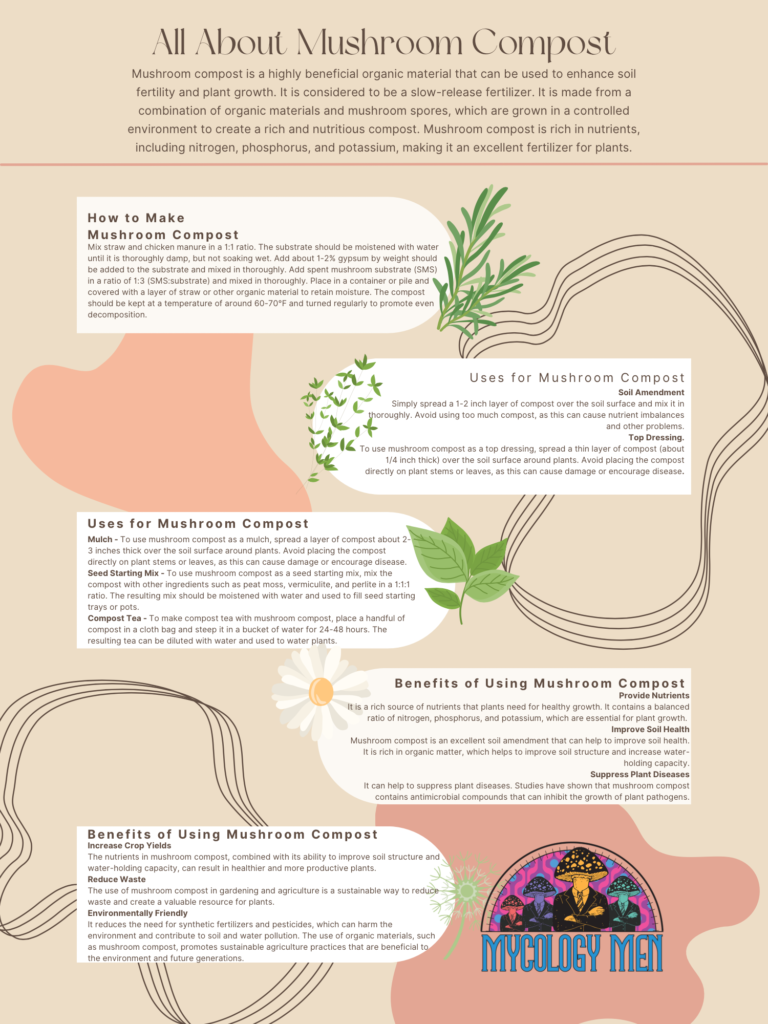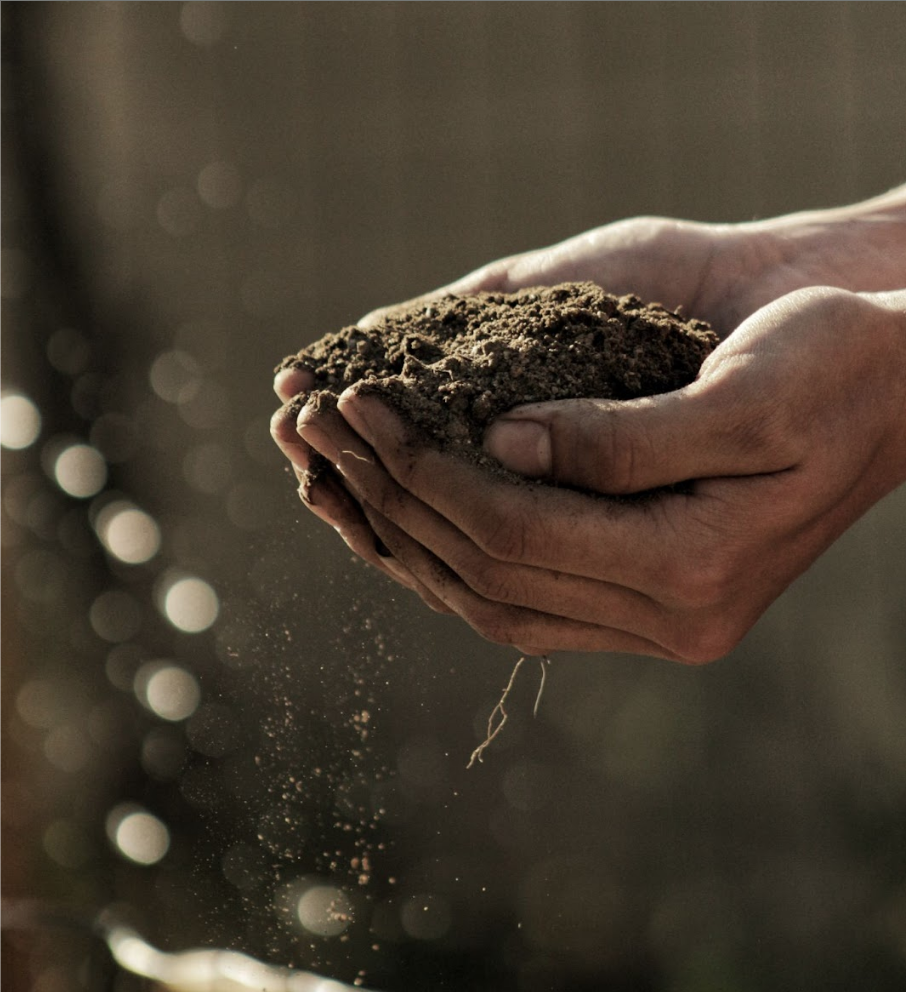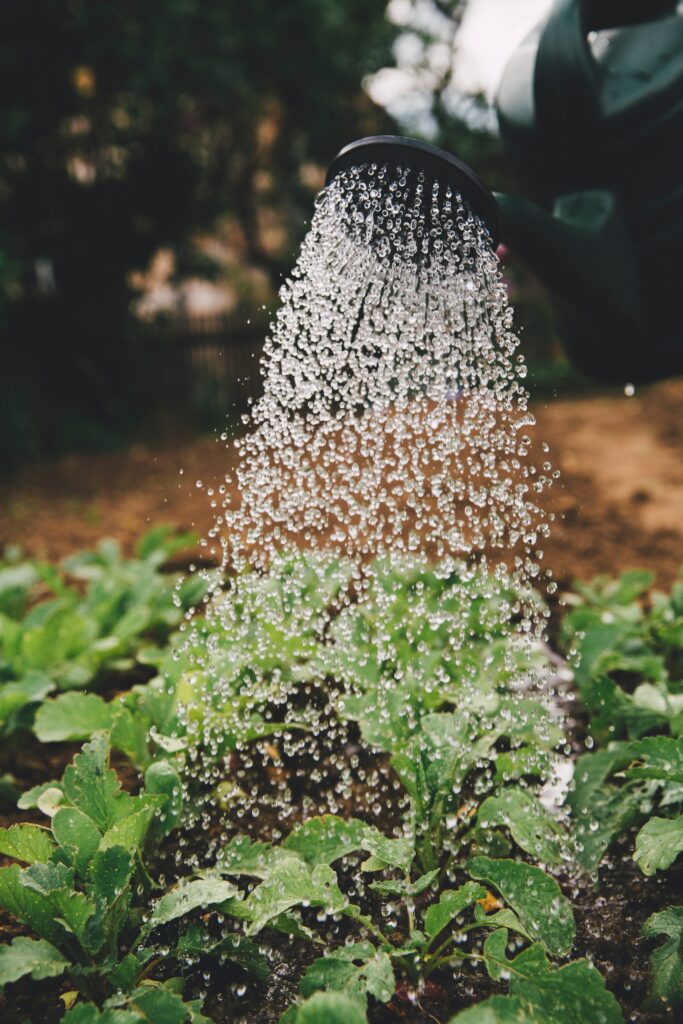All About: Mushroom Compost
Mushroom compost is a highly beneficial organic material that can be used to enhance soil fertility and plant growth. It is considered to be a slow-release fertilizer. It is made from a combination of organic materials and mushroom spores, which are grown in a controlled environment to create a rich and nutritious compost. Mushroom compost is rich in nutrients, including nitrogen, phosphorus, and potassium, making it an excellent fertilizer for plants.

To learn how to make mushroom compost, you will need the following ingredients:
The first step in learning how to make mushroom compost is to prepare the substrate. This is done by mixing straw and chicken manure in a 1:1 ratio. The substrate should be moistened with water until it is thoroughly damp, but not soaking wet. It is important to keep the substrate at the right moisture level, as too much water can cause the compost to become anaerobic and begin to rot.
Once the substrate is ready, it is time to add the gypsum. Gypsum is a natural mineral that helps to balance the pH of the compost and improves its texture. About 1-2% gypsum by weight should be added to the substrate and mixed in thoroughly.
After adding the gypsum, it is time to add the spent mushroom substrate (SMS). SMS is the material left over after a crop of mushrooms has been harvested. It contains mushroom spores, mycelium, and other organic matter, making it an excellent ingredient for compost. The SMS should be added to the substrate in a ratio of 1:3 (SMS:substrate) and mixed in thoroughly.
Finally, the compost should be placed in a container or pile and covered with a layer of straw or other organic material to retain moisture. The compost should be kept at a temperature of around 60-70°F and turned regularly to promote even decomposition.
Mushroom compost can be used in a variety of ways to enhance soil fertility and plant growth. Here are some of the most common uses of mushroom compost:

One of the simplest ways to use mushroom compost is as a soil amendment. This involves mixing the compost into the top few inches of soil in a garden bed or planting hole. The compost will help to improve soil structure and increase the availability of nutrients to plants.*
To use mushroom compost as a soil amendment, simply spread a 1-2 inch layer of compost over the soil surface and mix it in thoroughly. Avoid using too much compost, as this can cause nutrient imbalances and other problems.
Another way to use mushroom compost is as a top dressing. This involves spreading a thin layer of compost over the soil surface around plants. The compost will slowly release nutrients into the soil over time, providing a steady source of nutrition for plants.
To use mushroom compost as a top dressing, spread a thin layer of compost (about 1/4 inch thick) over the soil surface around plants. Avoid placing the compost directly on plant stems or leaves, as this can cause damage or encourage disease.
Mushroom compost can also be used as a mulch. This involves spreading a thick layer of compost over the soil surface to help retain moisture, suppress weeds, and regulate soil temperature.
To use mushroom compost as a mulch, spread a layer of compost about 2-3 inches thick over the soil surface around plants. Avoid placing the compost directly on plant stems or leaves, as this can cause damage or encourage disease.

Mushroom compost can also be used as a component of seed starting mixes. The compost provides a rich source of nutrients for seedlings and helps to promote healthy growth.
To use mushroom compost as a seed starting mix, mix the compost with other ingredients such as peat moss, vermiculite, and perlite in a 1:1:1 ratio. The resulting mix should be moistened with water and used to fill seed starting trays or pots.

Mushroom compost can also be used to make compost tea. Compost tea is a liquid fertilizer that is made by steeping compost in water. The resulting tea can be used to water plants and provide a rich source of nutrients.
To make compost tea with mushroom compost, place a handful of compost in a cloth bag and steep it in a bucket of water for 24-48 hours. The resulting tea can be diluted with water and used to water plants.
One of the main benefits of using mushroom compost is that it is a rich source of nutrients that plants need for healthy growth. It contains a balanced ratio of nitrogen, phosphorus, and potassium, which are essential for plant growth. Nitrogen is necessary for the production of chlorophyll, which is responsible for the green color of plants and is required for photosynthesis. Phosphorus is essential for root growth, and potassium helps plants to resist disease and stress. These nutrients are slowly released into the soil, providing a steady supply of nutrients to plants over an extended period.
Mushroom compost is an excellent soil amendment that can help to improve soil health. It is rich in organic matter, which helps to improve soil structure and increase water-holding capacity. The organic matter in mushroom compost provides a habitat for beneficial microorganisms, such as bacteria and fungi, that help to break down organic matter and make nutrients available to plants. The improved soil structure allows for better root penetration, which enhances nutrient uptake by plants. The increased water-holding capacity of soil also means that plants have access to more water, even during dry periods.
Another benefit of using mushroom compost is that it can help to suppress plant diseases. Studies have shown that mushroom compost contains antimicrobial compounds that can inhibit the growth of plant pathogens. The beneficial microorganisms in mushroom compost also compete with harmful microorganisms for resources, reducing the incidence of plant diseases. Using mushroom compost in soil can help to create a healthy environment for plants, which can reduce the need for chemical pesticides.
The use of mushroom compost in gardening and agriculture has been shown to increase crop yield in some studies. The nutrients in mushroom compost, combined with its ability to improve soil structure and water-holding capacity, can result in healthier and more productive plants. Some studies have shown that using mushroom compost can increase crop yield by up to 30 percent. This increase in crop yield can result in higher profits for farmers and increased food production for the world's growing population.*
Mushroom compost is often made from agricultural waste materials, such as straw, manure, and other byproducts. The use of mushroom compost in gardening and agriculture is a sustainable way to reduce waste and create a valuable resource for plants. Instead of discarding these materials, they are recycled and transformed into a nutrient-rich soil amendment.
The use of mushroom compost is an environmentally friendly way to improve soil fertility and plant growth. It reduces the need for synthetic fertilizers and pesticides, which can harm the environment and contribute to soil and water pollution. The use of organic materials, such as mushroom compost, promotes sustainable agriculture practices that are beneficial to the environment and future generations.
Mushroom compost is a highly beneficial organic material that can be used to enhance soil fertility and plant growth. It is made from a combination of organic materials and mushroom spores, which are grown in a controlled environment to create a rich and nutritious compost. Mushroom compost is rich in nutrients, including nitrogen, phosphorus, and potassium, making it an excellent fertilizer for plants. It can be used in a variety of ways, including as a soil amendment, top dressing, mulch, seed starting mix, and compost tea. By using mushroom compost, gardeners can improve the health and productivity of their plants in a natural and sustainable way.
Make sure to check out the rest of our blog for more mushroom growing tips!